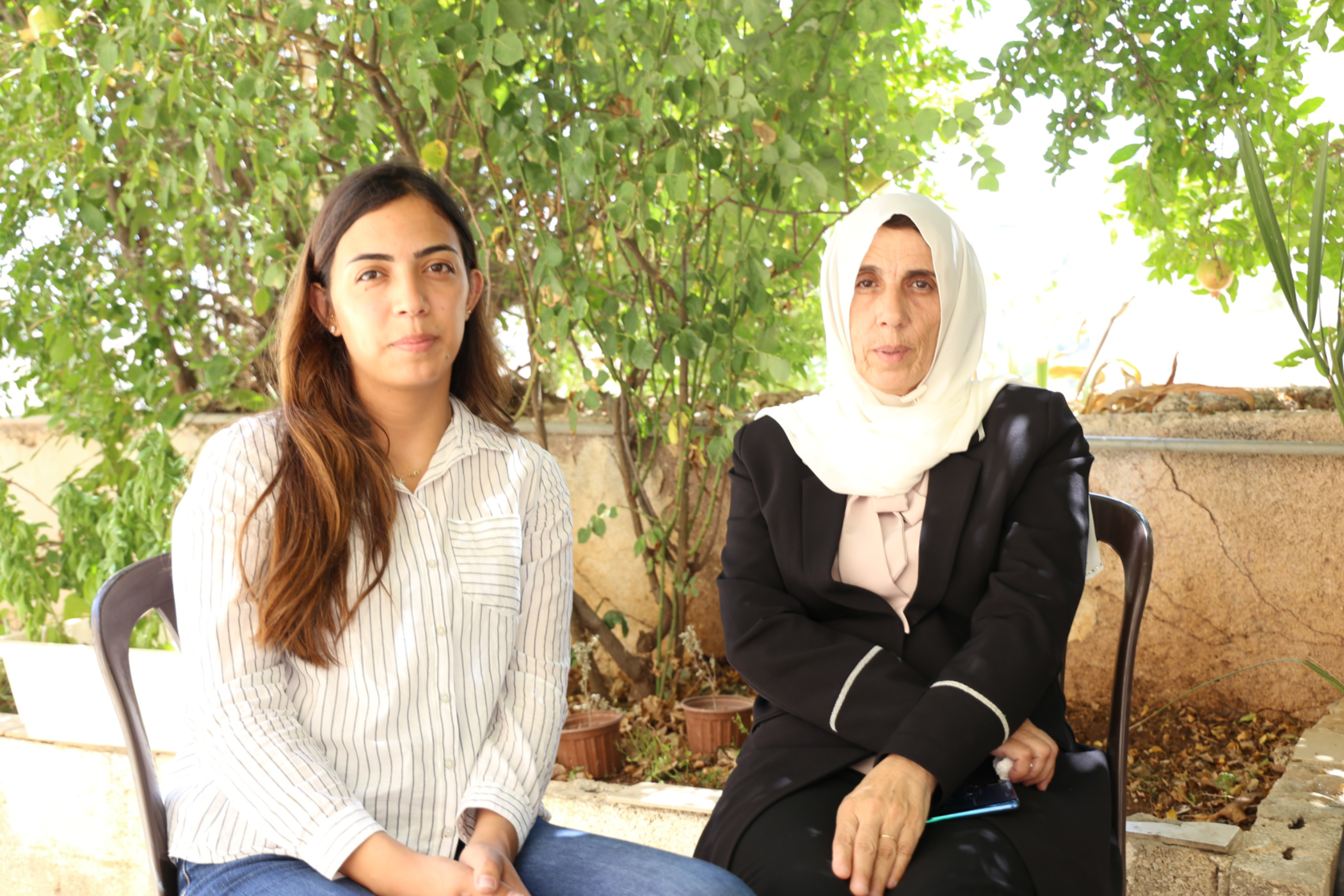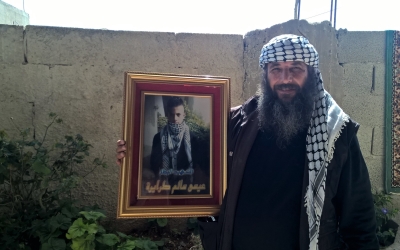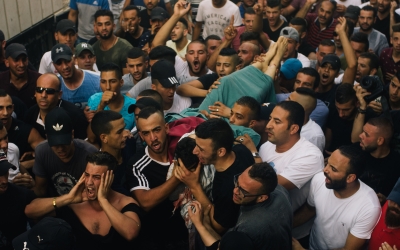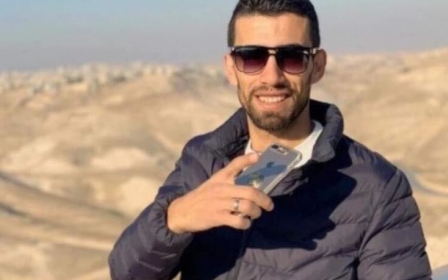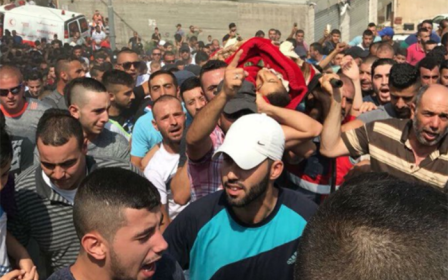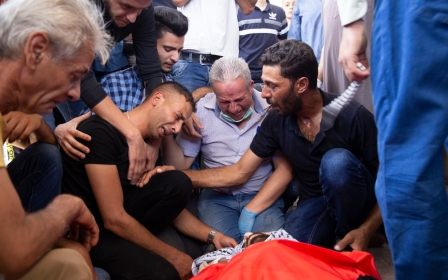Ahmed Erekat: No closure for Palestinian's family as Israel withholds body for weeks
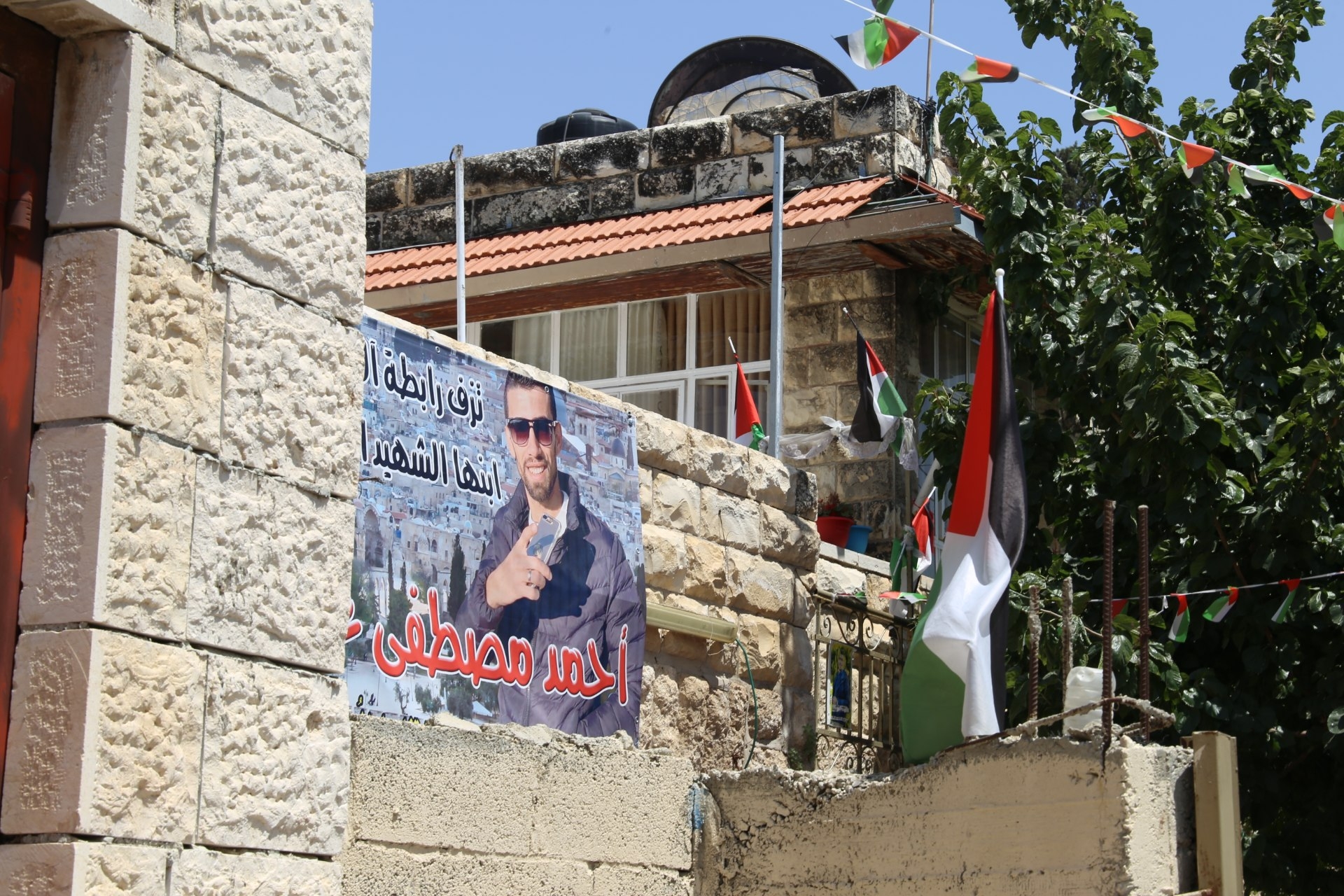
It has been almost one month since Farah Erekat’s brother Ahmed was killed by Israeli forces, on what was meant to be their sister Eman’s wedding day.
The bannister leading up to the family’s home is still adorned with the white lace handkerchiefs that had been set up for the wedding.
'To hold someone’s body after death, and keep them from their final resting place, is a punishment against humanity'
- Farah Erekat
The decorations, now joined by dozens of Palestinian flags and posters of a smiling Ahmed, are a daily reminder of what tragically turned into the worst day of the family’s life.
“It’s been 26 days since he was killed,” Farah told Middle East Eye from the courtyard of her family’s home in Abu Dis, a town just outside East Jerusalem, in the occupied West Bank.
“But we are still waiting for his body to return to us,” she said.
New MEE newsletter: Jerusalem Dispatch
Sign up to get the latest insights and analysis on Israel-Palestine, alongside Turkey Unpacked and other MEE newsletters
Ahmed was shot and killed on 23 June by Israeli security forces on his way to pick up his mother and sister for her wedding later that day.
Israeli police claim that Ahmed committed a car ramming attack, targeting Israeli officers stationed at the Container checkpoint, a permanent Israeli military checkpoint separating the southern West Bank district of Bethlehem from towns and cities to its north.
But his family says it was a car accident, and that he never would have committed an attack, let alone on his sister’s wedding day.
After several hours waiting to receive Ahmed’s body for the funeral, the family was informed that it was not going to be returned, as part of Israel’s policy of withholding the bodies of Palestinians accused of committing “terror attacks”.
Every day since then, Farah and her family have been fighting to get her brother's body returned to them.
“We are fighting in every way we can to bring Ahmed home,” Farah said. “We just want justice for Ahmed.”
‘Shoot-to-kill’
Ahmed is one of 22 Palestinians to be killed by Israeli forces in 2020.
His killing sparked a widespread outcry locally and internationally, after a video of the incident showed him exiting his vehicle and seemingly backing away from soldiers, with his hands up, when he was shot down.
He was then left on the ground bleeding for at least 30 minutes and was denied medical attention by soldiers at the scene.
“He didn’t do anything wrong, it was clearly an accident,” Farah said, recalling the surveillance footage of the moment her brother was killed.
Their mother, Najah, barely able to speak about her son without breaking down, joined in: “He got down from the car and held up his hands, but they still killed him.”
In the aftermath of his death, local and international activists decried Ahmed's killing as another example of Israel’s “shoot-to-kill” policy, which rights groups have slammed as “state-sanctioned executions”.
Since 2015, amid a wave of stabbings carried out by Palestinians against Israeli forces, the killing of Palestinians at checkpoints has become increasingly commonplace - even if alleged Palestinian suspects did not pose an immediate threat to the soldiers at the time.
Israeli human rights group B’Tselem has documented dozens of cases over the past few years in which it describes the conduct of Israeli soldiers as a “grave and alarming picture of excessive and unwarranted use of lethal gunfire, which in some cases was tantamount to the summary execution of assailants or suspected assailants”.
'We are fighting in every way we can to bring Ahmed home'
- Farah Erekat
The policy has consistently been backed by Israeli politicians, who advocate for the extrajudicial execution of Palestinians who are deemed as threats by Israeli security forces across the occupied territory.
Former Israeli defence minister Moshe Ya’alon has said: “Anyone who comes to kill Jews must be eliminated.
"Any terrorist who raises a gun, knife, or rock, tries to run over or otherwise attack Jews, must be put to death, depending on the circumstances.”
Noura Erekat, a US-based human rights lawyer who is also Ahmed’s cousin, told MEE: “What becomes so controversial here is that Israel labelled Ahmed a terrorist, and that was enough to suspend any form of critical inquiry about his case.
“In this case there were no questions asked on Israel’s part about investigations, or if this was actually a car accident.”
Bodies as 'bargaining chips'
When Israeli forces seized Ahmed's body after he was killed, the young business-owner became one of 63 Palestinians whose bodies are being held by Israel, under the pretext of using them as political “bargaining chips”.
Israel’s policy of withholding the bodies of Palestinians killed by its military has been in practice since 1967, and it is estimated that since then at least 253 bodies have been held in Israel’s “cemetery of numbers”, never returned to their families for a proper burial ceremony.
The practice, which has been widely condemned by human rights groups as a violation of international law, was started again in 2015, as Israel began detaining the bodies of dozens of Palestinians accused of attacks and putting them in freezers.
While the policy was initially focused on targeting politicians affiliated with Hamas, Israel began applying it to slain Palestinians of all or no political affiliations, under the pretext that the policy served as a “deterrent” against future attacks.
“This is an egregious policy that Israel frames as a matter of national security,” Noura Erekat said.
“They say they want to withhold these bodies for prisoner exchanges, but the people being held are not prisoners of war. These are civilians.”
In 2019, the Israeli Supreme Court upheld the policy, stating that emergency regulations allow the Israeli military to order the temporary burial of the bodies of Palestinians classified as enemies “based on considerations that take into account state security, civil order, and the need to negotiate for the return of the bodies of Israeli soldiers”.
Palestinian human rights organisation Al-Haq slammed the ruling at the time, saying it “amounts to a discriminatory practice of Enforced Disappearance, cruel and inhumane treatment of grieving bereaved families, and to an act of collective punishment against Palestinians”.
“Just imagine any tragic death; it’s an unexpected moment of horror, outside of your control or prediction”, Noura Erekat said.
“And after that tragic death, you see the live filming of his execution, then him bleeding out to death. Imagine in the aftermath of all that, not being able to have any closure."
'He had dreams, and he achieved some of them, but Israel killed the rest'
-Farah Erekat
Farah said: “I don’t know how we are surviving right now.
"God has given us a kind of strength during this time that I can’t describe.
“We lost an amazing human. He was the most perfect brother,” she said, a small smile spreading across her face as she remembered Ahmed.
Farah described Ahmed as an independent and hardworking person, recounting how, after scoring poorly on his final high school exams, he immediately poured his heart into launching what eventually became a successful T-shirt printing company.
“He was a kind person; he was a giver. He was going to get married soon. He had dreams, and he achieved some of them, but Israel killed the rest,” she said.
Getting justice
While many Palestinian families, like the Erekats, continue to wait in agony to bury their loved ones, some families have successfully ensured the return of their family members, but only through painstaking legal procedures and intense local and international pressure.
Even upon agreeing to return the bodies of slain Palestinians, Israeli authorities typically place a number of conditions upon their release.
Noura Erekat said these conditions include paying a sum of money, burying the body in the middle of the night, and only allowing a limited amount of people to attend the funeral.
Despite the legal obstacles facing them, the Erekat family is pursuing every avenue, both locally and internationally, to ensure that justice is given to Ahmed.
The family has taken up legal counsel from Adalah - The Legal Center for Arab Minority Rights in Israel.
Adalah declined to comment on details related to Ahmed’s case, which it is pursuing in an Israeli court, due to the sensitivity of the matter.
According to the family, there will be a court session on 22 July to determine whether Ahmed’s body will be returned.
While she has hope that her brother will come back to her family, Farah said they are heavily relying on international pressure to tip the scales in their favour, pointing to an urgent appeal sent by the family to UN Special Procedures demanding justice and accountability for Ahmed’s killing.
“The world needs to see what Israel is doing here in Palestine, and we need to stop it,” she said.
“This is not just collective punishment. To hold someone’s body after death, and keep them from their final resting place, is a punishment against humanity.”
Wiping tears from her face, Najah, Ahmed’s mother, urged the international community to “step in and put pressure on Israel”.
“I’m tired”, she said. “The days are hard, very hard. All I want is for him to come back to me. He’s up in heaven now, but I want him here.”
Middle East Eye delivers independent and unrivalled coverage and analysis of the Middle East, North Africa and beyond. To learn more about republishing this content and the associated fees, please fill out this form. More about MEE can be found here.


